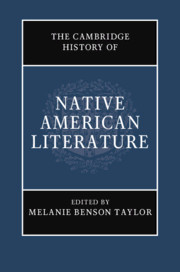Book contents
- The Cambridge History of Native American Literature
- The Cambridge History of Native American Literature
- Copyright page
- Contents
- Figures
- Contributors
- Introduction: What Was Native American Literature?
- Part I Traces and Removals (Pre-1870s)
- Part II Assimilation and Modernity (1879–1967)
- Part III Native American Renaissance (Post-1960s)
- Part IV Visions and Revisions: 21st-Century Prospects
- 23 Native American Horror, Fantasy, and Speculative Fiction
- 24 Charting Comparative Indigenous Traditions
- 25 The Global Correspondence of Native American Literatures
- 26 Indigenizing the Internet
- 27 Indigenous Futures beyond the Sovereignty Debate
- 28 The Leftovers
- 29 Can You See the Indian?
- Index
- References
24 - Charting Comparative Indigenous Traditions
from Part IV - Visions and Revisions: 21st-Century Prospects
Published online by Cambridge University Press: 18 September 2020
- The Cambridge History of Native American Literature
- The Cambridge History of Native American Literature
- Copyright page
- Contents
- Figures
- Contributors
- Introduction: What Was Native American Literature?
- Part I Traces and Removals (Pre-1870s)
- Part II Assimilation and Modernity (1879–1967)
- Part III Native American Renaissance (Post-1960s)
- Part IV Visions and Revisions: 21st-Century Prospects
- 23 Native American Horror, Fantasy, and Speculative Fiction
- 24 Charting Comparative Indigenous Traditions
- 25 The Global Correspondence of Native American Literatures
- 26 Indigenizing the Internet
- 27 Indigenous Futures beyond the Sovereignty Debate
- 28 The Leftovers
- 29 Can You See the Indian?
- Index
- References
Summary
What might a truly comparative Native American and Indigenous literary studies look like? Building from an extended contextualization and “literary” analysis of a work of carving, painting, inlay, and assemblage, this essay suggests a range of possible approaches to comparative, global, and/or trans-Indigenous projects based in engagements with alphabetic literatures. Both the sculptural and alphabetic examples expose ways in which the work of contemporary artists and writers elucidates neither Indigenous stasis nor Indigenous isolation—as colonial stereotypes continue to assert—but rather Indigenous connections to wider worlds, often in multiple ways simultaneously, and often explicitly within processes of real and imagined travel. In these examples, artists and writers center the Indigenous in their works in terms of the cultures, histories, and aesthetics they reference and engage, but also in the very conceptions of space, place, movement, and time their works evoke and, indeed, enact.
Keywords
- Type
- Chapter
- Information
- The Cambridge History of Native American Literature , pp. 447 - 464Publisher: Cambridge University PressPrint publication year: 2020
References
- 1
- Cited by

